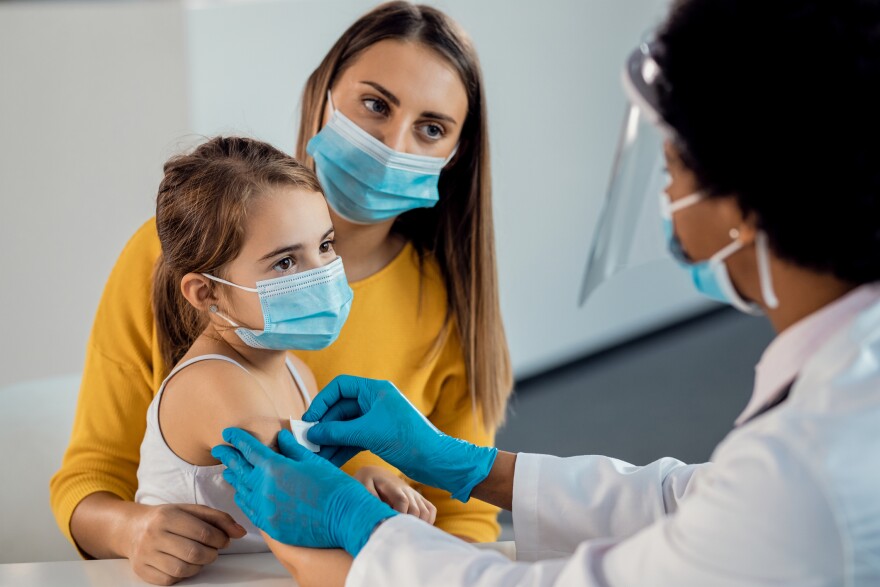Pfizer’s COVID-19 vaccine for children ages 5 to 11 cleared its first regulatory hurdle Tuesday. A full emergency authorization is expected next week.
If that happens, children in Utah could start receiving their first dose as soon as Nov. 8, according to Dr. Andrew Pavia, the chief of pediatric infectious diseases at University of Utah Health. Kids are expected to have similar recommendations to adults, receiving two doses of the vaccine 21 days apart. The doses are smaller though.
Pavia said preliminary data on the vaccine for young kids found it was close to 91% effective at preventing symptomatic cases of COVID-19 and about 70% effective at preventing mild or asymptomatic cases. At a news conference Tuesday, he said no serious side effects were reported, though the sample size of roughly 3,200 kids is small.
Pavia said while serious cases of COVID-19 are rare in kids, it can happen. Nearly 600 kids in Utah have been hospitalized. Roughly 5-8% of those cases come with the lingering symptoms associated with “long COVID.” But he said the vaccine will protect kids from those serious complications and help reduce spread to older people.
“We do think that if we can get a substantial portion of kids in this age group vaccinated, it will help us get the pandemic under control,” he said. “If there was no benefit to children themselves, I think we'd be making different decisions. But there's a big benefit to children, as well as a benefit to the family, as well as a benefit to the community.”
There are approximately 365,000 Utah children between the ages of 5-11 who will be eligible for the vaccine, according to the Utah Department of Health. It’s unlikely all will take the vaccine, but Pavia said with more than 13,000 school-related COVID cases in students so far this year, he wouldn’t hesitate to get his kid vaccinated.
Paul Gibbs, a parent in the Granite School District, said the pending approval is the best news he’s heard in a long time. He has two healthy sons, aged two and five, but is on immunosuppressant medication after receiving a kidney transplant 12 years ago.
Gibbs said he’s kept his older son home from school and has limited their activities with others to protect his own health.
“It’s the most painful thing I’ve ever experienced,” he said. “Every day I question whether keeping me alive is worth it. I have to be reminded again and again that they need me.”
Gibbs said once his older son is vaccinated he’ll be able to go back to school in person. The family is looking forward to having a real birthday party when he turns six in January. It will be small, he said, but it’s a step towards a more normal life.
“He definitely misses being around other kids and being able to go more places, but I'm amazed by his maturity and compassion in the way he's handled it,” he said.
Pavia said there are no hard and fast rules when it comes to COVID. Everyone, even those who are vaccinated, must assess their own risk level based on individual circumstances and transmission levels in their community.
He said parents should feel comfortable allowing their vaccinated kids to attend class and visit older adults. But if a child has a medical condition that affects their immune system, such as cancer, he said he would be more cautious, as they face a higher risk of serious complications even with a vaccine.
Until community transmission levels go down, Pavia said it’s also wise for children to continue masking in high-risk situations, such as crowded, indoor spaces.
As for schools, he said safety precautions — while not as strict as last year’s measures — also shouldn’t change until case rates start going down.
Officials with the Utah Department of Health don’t anticipate changing guidance for schools, according to a spokesperson. It recommends eligible students get vaccinated, wear masks indoors and stay home if they have symptoms of COVID-19.
K-12 students are not required to get a COVID-19 vaccine to attend school, however, and only two districts have mask mandates.






